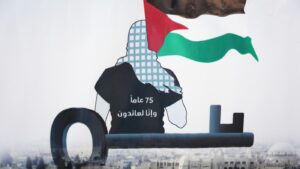
Pedro Brieger writes in Middle East Eye 18 May 2023
Recognising the catastrophe of Palestinian expulsion in 1948, the Arabic term ‘Nakba’ has emerged as a political concept, using collective memory as resistance
On 22 November 2022, the United Nations General Assembly asked the Division of the Secretariat for Palestinian Human Rights to “dedicate the activities of 2023 to commemorate the 75th anniversary of the Nakba”.
The Palestinian population suffered the Nakba – the Arabic word for “catastrophe” – when their society was destroyed with the creation of Israel in 1948. The UN official request recognises its role in the forced expulsion of more than 700,000 Palestinians from their lands, through resolution 181, the “Partition Plan”, which proposed dividing the territory of Palestine into two states, one Arab and one Jewish.
At that time, the world celebrated the creation of the Jewish state as a response to the genocide perpetrated against the Jews by Nazism. Very few outside the Arab world paid attention to the expulsion of hundreds of thousands of people from their homes. It continued to such an extent that it took decades for the term “Nakba” to gain traction as a political concept identifying the catastrophe suffered by the Palestinians.
Despite its appearance in a 1948 book by Syrian intellectual Constantin Zureik, popular use of the word “Nakba” was short-lived until the end of the 1980s. Though it is widely invoked today, it was not part of the Palestinian political narrative for almost 40 years. This does not mean that the catastrophe was unknown, quite the contrary; it was often referenced as part of the collective memory.
For this reason, it is interesting to examine why the word “Nakba” was hardly used for decades only to later reemerge as a political concept in itself, with the original Arabic being used without translation in all languages, including Hebrew.
The importance of words
In any political issue, let alone in the Palestinian-Israeli conflict, words play an important role in shaping public discourse. The inclusion and exclusion of words, a deliberate choice and not left to chance, is part of a dialectical game that seeks to impose a narrative whether locally or in the mass media.
The spread of the term ‘Nakba’ has debunked Israel’s version of history, which erases the systematic destruction of the pre-existing Palestinian society
The use, repetition, and internationalisation of a concept can have a positive or negative connotation. Perhaps the best-known case is how the term “apartheid” – in its own language of Afrikaans – became understood globally as a system of exclusion and segregation, and not only with respect to the Black population of South Africa.
The 1987 Palestinian uprising allowed an Arabic word, for the first time in the history of the conflict, to penetrate the international media, and even the discourse within Israel, without pejorative connotation. The Intifada, which literally means “shake” or to shake something (annoying) off one’s shoulders, later became identified – and, to a certain extent, legitimised – as the Palestinians’ peaceful fight against the powerful Israeli army.
Other words that gained international recognition include the Arabic word fedayeen (fighters), though it was initially only claimed by those who supported the struggle of the Palestinian resistance. The Naksa, which means setback or defeat, became widely used in reference to the June 1967 war when the Israeli army occupied the West Bank, East Jerusalem, Gaza Strip, the Egyptian Sinai Peninsula, and the Syrian Golan Heights. The expression, however, does not hold the same weight outside of the Arab world.
Until 1987, most western media outlets were influenced by the Israeli version of events. An example of this is the 1973 Arab-Israeli war that became known in the West as the “Yom Kippur War” when Arabs generally refer to it as the “October War” or the “Ramadan War”.
For decades, the Nakba that Palestinians suffered in 1948 was absent from any narrative that embraced Israel’s version of history, which celebrates its statehood and “independence” while erasing the systematic destruction of the pre-existing Palestinian society.
However, oral transmission, poetry, stories about the lost land, research carried out by Palestinian intellectuals, and the spread of the term Nakba to denote the catastrophe suffered by the Palestinian people in 1948 have managed to debunk the version disseminated by Israel.
More …

